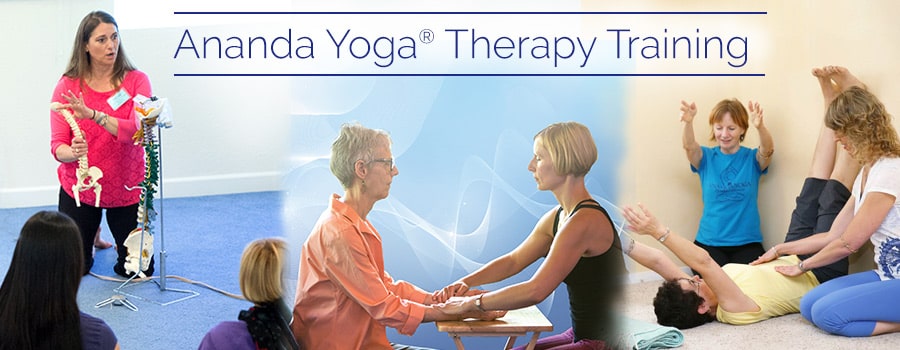SYLLABUS
Ananda Yoga® Therapy Training: Holistic Health Therapist Training
We are not currently accepting new students in the Ananda Yoga Therapy Training
Course Hours: Total = 49 (Residential and Distance)
- Residential: 37 (with 11 hours Practicum)
- Distance: 12 (as Home Practice)
- Practicum: 23 (11 Residential, 12 Distance)
Prerequisite
Enrollment in the Ananda Yoga® Therapy Training.
This should be one of the last courses that the Ananda Yoga Therapist Trainee takes in the curriculum as it draws on skills from all the previous modules.
Teaching Format
This is a 5-day residential course which includes a combination of lecture, discussion, experiential, mentored practicum with clients. (residential and distance)
Course Description
In many ways, the Ananda Holistic Health program is the course that most essentially captures the whole of Ananda Yoga Therapy. It is a program that incorporates the most important healing modalities of Ananda Yoga Therapy in a Holistic Health framework for our guests at The Expanding Light. Participants have daily guided practices of Energization Exercises, yoga postures, and meditation, daily vigorous affirmation walks, guided yoga techniques for greater energy, therapeutic and restorative yoga, instruction in a meditation technique, a comprehensive reference manual for holistic radiant health, 3 delicious and healthy vegetarian meals daily, Menus and recipes for healthy meals to take home with you, individual coaching/counseling to help you create a plan for healthy changes in your lifestyle.
Yoga Therapy Trainees participate as teaching/coaching assistants in this guest program that has been offered at The Expanding Light since 2009. Therapist trainees receive mentoring by faculty in coaching to help clients make lifestyle changes. Trainees also attend classes on meditation, affirmation/visualization, brain plasticity, positive attitudes, diet, purification and toxin free living with clients followed by separate meetings with faculty to learn how to set up these classes as part of their therapeutic yoga offering in their own community setting Being able to work with the same clients going through a transformational experience over a 5 day residential training offers many unique learning opportunities
Faculty: Ananda Ministers
Nayaswami Mangala Loper-Powers RN, MN, NP, E-RYT 500, Ananda Yoga Therapist, C-IAYT
Maitri Jones, RN, BSN, E-RYT 500, Ananda Yoga Therapist, C-IAYT
Nayaswami Mantradevi LoCicero, Ananda Yoga and Meditation Teacher, Spiritual Counselor
Required Texts/Reading Materials
Ananda Holistic Health Manual. The Expanding Light, 2018.
Learning Objectives
At the completion of the course, students will:
- Demonstrate practical client assessment skills (including structural and functional assessment, basic Ayurvedic constitution assessment)
- Demonstrate ability to take a client history, create, document, and evaluate individualized therapeutic plans
- Learn how to design individualized yoga therapy regimes
- Demonstrate understanding of the importance of the power of the mind; the use of affirmations, visualizations, and mantra.
- Understand how to establish therapeutic relationships with clients, how to set clear boundaries; what are professional and ethical boundaries; listening and communication skills.
Subject Matter/IAYT Competencies Covered
Section 1. Yoga Foundations
Category 1.1. Yoga Teachings and Philosophy
1.1.1 Familiarity with the evolution of the teachings and philosophy of the yoga tradition and its relevance and application to yoga therapy, including teachingsfrom Vedic and post-Vedic periods, Samkhya,Yoga,Tantra, and Ayurveda.
Category 1.2. Yoga and the Mind
1.2.1 Knowledge of yoga perspectives on the structure, states, functioning, and conditions of the mind.
1.2.1.1 drashtr (seer), drshya (seen);
1.2.1.2 antahkarana citta (consciousness), buddhi (intellect), ahamkara (ego), manas (mind);
1.2.1.3 citta vrtti (activities of the mind), citta pariama (structural changes in the mind),vyutthana/nirodha (mind’s potential for distraction and focus);
1.2.1.4 artha (cognition), bhava (mood), svabhava (inborn nature), vasana (residue of experience),samskara (conditioned pattern of thinking and behavior);
1.2.2 Knowledge of yoga perspectives on distracted/disturbed conditions of mind
and their expressions as expressed in such texts as the Yoga Sutras, the Bhagavad Gita, and other texts.
1.2.2.3 duhkha and daurmanasya (suffering/discomfort and negative attitude/thinking), sarupyam (identification with the contents of the mind or seer taking the same form as the mind); and
Category 1.3. Framework for Health and Disease
1.3.1 Knowledge of the basic perspectives on health and disease from yoga and Ayurveda relevant to the practice of yoga therapy, including the concepts of
1.3.1.2 subtle anatomy;
1.3.1.3 tri-dosha (effect of the elements on the physical body);
1.3.1.4 tri-guna (effect of sattva (equilibrium), rajas (activity), tamas [inertia]);
1.3.1.6 ama (undigested food, emotions, etc. accumulated in the body);
1.3.1.7 agni (internal fire(s) and their contribution to health);
1.3.2 Knowledge of categorizing illness.
Section 2. Biomedical and Psychological Foundations
Category 2.1. Anatomy and Physiology
2.1.2 Knowledge of biomechanics and movement as they relate to the practice of yoga and the work of a yoga therapist.
2.1.3 Knowledge of common pathologies and disorders of all the major systems, including symptoms, management, illness trajectories, and contraindications, as relevant to the work of a yoga therapist.
Category 2.2. Additional Biomedical Knowledge
2.2.1 Familiarity with commonly used drugs and surgical procedures, as relevant to the work of a yoga therapist.
2.2.2 Familiarity with common medical terminology.
2.2.3 Knowledge of how to reference current healthcare information relevant to the work of a yoga therapist, including pathologies, disorders, drugs, and surgical procedures, as relevant to the work of a yoga therapist.
Category 2.3. Psychology and Mental Health
2.3.1 Basic knowledge of commonly occurring mental health conditions—from psychological distress to psychiatric conditions—their symptoms, and common approaches/interventions, as they relate to the work of a yoga therapist.
Category 2.4. Additional Knowledge
2.4.1 Familiarity with models of human development, including developmental stages, lifecycles, and personality, and their importance to medical and psychological health and well-being
2.4.2 Familiarity with the influence of familial, social, cultural, and religious conditioning on mental and medical perspectives of health and healing.
Category 2.5. Body and Mind Integration
2.5.1 Knowledge of the interaction of the body, breath, mind, intellect, and emotions in health and well-being.
Section 3. Yoga Therapy Tools and Therapeutic Skills
Category 3.1. Yoga Practices
3.1.1 In-depth knowledge of the application of yama and niyama.
3.1.2 In-depth knowledge of the range of yoga practices and their potential therapeutic effects for common conditions Practices may include, but are not limited to,
3.1.2.2 Pranayama (regulated breathing);
3.1.2.3 Meditation and relaxation techniques such as bhavana (visualization), mantra (recitation), and ritualized activities such as nyasa and mudra; and
3.1.3 In-depth knowledge of contraindications of yoga practices for specific
conditions and circumstances.
Category 3.2 Basic Principles of the Therapeutic Relationship
3.2.1. In-depth knowledge of and demonstrated ability to implement effective teaching methods, adapt to unique styles of learning, provide supportive and effective feedback, acknowledge the client's/student's progress, and cope with unique difficulties/successes.
3.2.2. In-depth knowledge of and demonstrated ability to transmit the value of self-awareness and self- responsibility throughout the therapeutic process.
3.2.3. In-depth knowledge of and demonstrated ability to develop and adjust appropriate practice strategies to the client/student.
Category 3.3 Principles and Skills for Educating Clients/Students
3.3.1. In-depth knowledge of and demonstrated ability to implement effective teaching methods, adapt to unique styles of learning, provide supportive and effective feedback, acknowledge the client's/student's progress, and cope with unique difficulties/successes.
3.3.2. In-depth knowledge of and demonstrated ability to transmit the value of self-awareness and self- responsibility throughout the therapeutic process.
3.3.3. In-depth knowledge of and demonstrated ability to develop and adjust appropriate practice strategies to the client/student.
Category 3.4 Principles and Skills for Working with Groups
3.4.1. Basic knowledge of and demonstrated ability to design, implement, and evaluate group programs.
3.4.2. Familiarity with group dynamics and techniques, including communication skills, time management, and the establishment of priorities and boundaries, as well as techniques to address the specific needs of individual participants, to the degree possible in a group setting.
Section 4. Practicum
Category 4.1 Providing Yoga Therapy
4.1.1. In-depth knowledge of the application of yama and niyama.
4.1.2. In-depth knowledge of the range of yoga practices and their potential therapeutic effects for common conditions Practices may include, but are not limited to,
4.1.3. In-depth knowledge of contraindications of yoga practices for specific conditions and circumstances.
4.1.4. Demonstrated ability to apply knowledge of how to determine which aspects of the client/student's conditions, goals, and aspirations might be addressed through yoga therapy.
4.1.5. Demonstrated ability to identify priorities and set both long- and short-term goals with the client/student.
4.1.6. Demonstrated ability to apply knowledge of pacification, purification, and strengthening strategies.
4.1.7. Demonstrated ability to apply knowledge of strategies that address common disorders and pathologies of the major human systems and common mental health conditions, as well as other goals and aspirations of the student as relevant to the work of a yoga therapist.
4.1.8. Demonstrated ability to apply knowledge of how to combine intake, evaluation, observations, and working assessment to develop an appropriate practice or session strategy for individual clients/students as well as group classes, taking into consideration the holistic nature of the individual.
4.1.9.. Demonstrated knowledge of how to choose and prioritize the use of yoga tools and techniques, including selecting, sequencing, adapting, and modifying yoga practices appropriate to the needs of clients.
4.1.10. Demonstrated ability to teach or deliver the appropriate practices for individuals as well as groups, taking into consideration the assessment of their conditions, limitations, possibilities, and the overall practice strategy.
4.1.11. Demonstrated ability to facilitate the client/student's experience of the practice, including
4.1.12. Demonstrated ability to develop and maintain therapeutic relationships
4.1.13. Demonstrated ability to provide follow up and re-planning, including
Section 5 Professional Practice
Category 5.1. Ethical Principles
5.1.1. In-depth knowledge of yoga practices and methods for self-inquiry related to establishing, practicing, and maintaining ethical principles.
5.1.2. In-depth knowledge of generally accepted ethical principles of health care codes of conduct and yoga's ethical principles.
5.1.3. Demonstrated ability to apply knowledge of generally accepted ethical principles and related concepts from the yoga tHHition to professional interactions and relationships.
5.1.4. In-depth knowledge of the scope of practice of yoga therapy, resulting in the demonstrated ability to discern the need for referral to other modalities.
5.1.5. Knowledge of the extent of one's own individual training, skills, and evolving experience in yoga therapy, and knowledge of the importance of practicing within such parameters.
Category 5.3. Relationships with Peers, Mentors, Clinicians, and Organizations
5.3.1. Basic knowledge of other healthcare fields and their potential role in and relevance to the work of a yoga therapist.
5.3.2. Basic knowledge of how to establish, maintain, and utilize a referral network of peers and related healthcare practitioners and organizations.
5.3.3. Basic knowledge of how to develop and maintain ongoing collaborative relationships.
Course Completion Requirements
Attendance at all lectures, participation in all discussions, case studies and practicums. Completion of required reading assignments, including the whole Ananda Holistic Health Manual. Understanding of material covered as demonstrated by satisfactory performance (80%) on in-class quizzes and reviewed practicum assignments.
Ananda Yoga Therapy Training
- Overview
- Flow Chart of Ananda Yoga® Therapy Training Courses
- Course Syllabi
- Tuition Costs
- Ananda Yoga® Therapy Training Courses Scheduled
- Frequent Questions
- Instructors
- Apply for Level 1
- Student Handbook with Costs
- Bridge to Ananda Yoga
Upcoming Courses in date order
- Bhagavad Gita Retreat
- The Essence of the Yoga Sutras According to Paramhansa Yogananda
- Ananda Meditation® Teacher Training - In Person
- Advanced Pranayama
- Ananda Yoga® Assistantship
- Ananda Yoga® Therapy Training: Principles
- Ananda Yoga® Advanced Training: Therapeutic Yoga for Seniors and Bone Strength
- Restorative Ananda Yoga® Teacher Training - In Person
- Ananda Yoga® Therapy Training: Musculoskeletal–1
- Ananda Yoga® Therapy Training Online: Ayurveda
- Ananda Yoga® Therapy Training Online: Health Challenges–1
- Ananda Meditation® Solutions
- Ananda Spiritual Counseling® Training - In Person
- Ananda Yoga® Therapy Training: Musculoskeletal–2
- Ananda Yoga® Therapy Training Online: Health Challenges–2
- Ananda Yoga® Therapy Training: Psychology and Mental Health
- Ananda Yoga® Therapy Training: Holistic Health Therapist Training
Nursing CEU Eligible: details coming

How to Choose a
Yoga Teacher Training Program
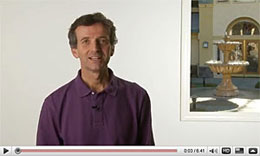
“My 4 weeks of Ananda Yoga Teacher Training was one of the most fulfilling and spiritually transforming periods in my life. All of the faculty, along with the entire Ananda community, were very supportive and nurturing.” – R. F., Lake Bluff, IL.

Testimonial for the Ananda Yoga Therapy Training Program
“The program is all embracing ˜ asana, ayurveda, chakras, special health issues touching on body, mind, and spirit. The instructors were wonderful, knowledgeable, supportive, and enthusiastic.” – T.C., CA.


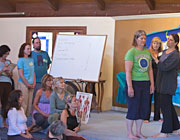

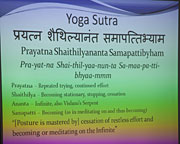
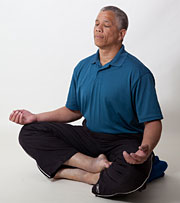
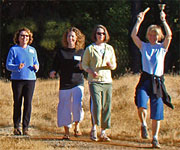
The yoga therapy components of these courses are based on our accreditation by IAYT, not derived from our status as an RYS with Yoga Alliance Registry.


CONNECT
14618 Tyler Foote Rd
Nevada City, California 95959
Toll free 800-346-5350
Outside US 530-478-7518
LEARN MORE
SUBSCRIBE
Receive uplifting emails with inspirational content and news about our retreat programs, travels, and trainings.



